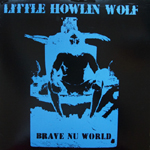|
|
 |
Dusted Reviews
Artist: Little Howlin' Wolf Album: Brave Nu World Label: Heresee Review date: Aug. 23, 2005 |

|
|
|
 |
Little Howlin’ Wolf – along with Buccaneer Bob, Shadow Drifter and Deacon Blue – is a moniker employed by James Pobiega, a formidable man in both appearance and musical ability from the South Side of Chicago. Performing primarily as a street musician in his hometown in the 1970s and ’80s, Pobiega amassed a catalogue of 32 7” singles and two full-length albums, all self-financed and self-released. Baltimore-based noise artists Nautical Almanac’s Heresee Records has made Pobiega’s 7” output available through a series of CD-R releases. The music documented is considerably more diverse and bizarre than the music that’s typically sold out of a street musician’s instrument case, spanning from the expected lo-fi blues to more adventurous explorations in chants and drones. No more conventional is Pobiega’s first recorded work in 18 years, Brave Nu World, which gradually and thoroughly deconstructs the blues to expose something more primal.
A street musician, with his or her direct dependence on the urban environment for performance space and livelihood, perhaps forges a unique bond with the musical traditions of a city. Brave Nu World agrees, as it is well literate in the musical heritage of Chicago, particularly the blues of Chess Records and the free jazz that gave birth to the Association for the Advancement of Creative Musicians. The influence of his namesake, Howlin’ Wolf, is evident on tracks such as “Big Ole Bear,” but the occasionally discordant scales of the rhythm and lead indicate something is amiss. Soon, notes are dropped, and the percussion seems to be navigating around a tool shed in the dark, with its failure sometimes crashing to the forefront. More wrenches are thrown into the standard blues fair, until the sinister undertones come to a head with the first side’s last song, “Eulb,” where the percussion is finally severed from the rest of the rhythm section, and Pobiega’s singing turns to demented, baritone scat.
The blues continues to fall apart with the second side of the album, resembling the free music of Godz more than the Windy City blues of Muddy Waters. The sides’ centerpiece title track is a sprawling 14-minute tempest of crank-operated percussion, ballpark organ, scat gibberish, ceremonial drumming, and a Flagellates’ procession. Volume cuts in and out, as if a tuner is scrolling through a series of stations, each playing the same twisted musical interlude to a radio drama. The effect creates a very different Brave Nu World depending on which side is played, and Pobiega seems to consciously acknowledge this contrast with his titling of the first and second sides of the album “Ole” and “Nu.”
With his street musician credentials and his unique background – he claims to have spent time as a bounty hunter, secret agent, and scuba diving instructor – Pobiega should be eagerly embraced by fans of “outsider music.” The label of “outsider music” has been applied to the naïve, accidental creations of Wesley Willis as well as the reclusive, visionary brilliance of Skip Spence. Considering Brave Nu World’s first half, it might be easy to paint Pobiega as a bumbling street musician, whose amateur take on Chess Records’ legacy wonderfully exposes the crucial rawness of the music. However, the remaining half reveals a deliberate artist bent on departing from the “ole” and creating the “nu.”
This control and command over music is well illustrated by the contrasting halves’ points of reference: Folkways, with its documentary approach, and ESP-Disk, with its emphasis on complete artistic control. Thus, the explorations in free improvisation of Brave Nu World’s second half legitimize the rambling blues of the first, not as great music created by the naïve, but as a conscious deconstruction of old blues-forms. In the tradition of the music of Spence, Syd Barrett, and Jandek, Brave Nu World is the singular, untainted expression of a true outsider.
By Bob Hammond
|







